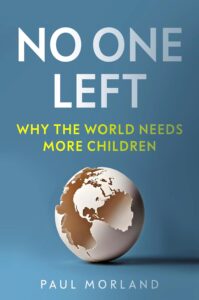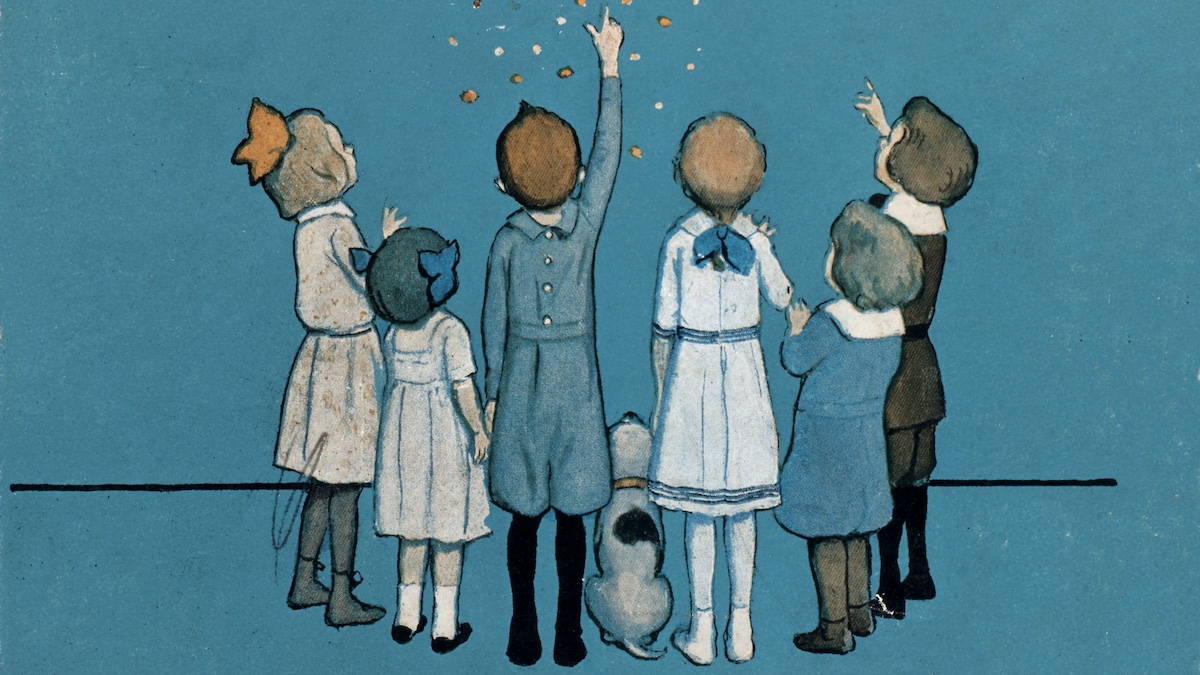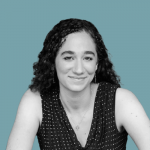This article was adapted from remarks given at the Yale Political Union, a philosophical debating society, in favor of the resolution Resolved: Have More Kids.
It’s a pleasure to return to the Yale Politician Union, especially as I owe this debating body my husband, and thus the existence of my own kids. There may be better ways to get a date than gathering every week to ask how to live well and be cross-examined on your answer, but it’s the best one I found. Tonight, I return to speak in the affirmative of Resolved: Have More Kids, and I want to be clear about what exactly I am asking members of this body to do. When I ask you to have more kids, I’m asking you to have them sooner and have more of them in total than someone would expect when they know that you went to Yale.
I’m pitching you on more kids because children are good in themselves and they’re also good for you. What I’m counseling is an openness to life, both in your own life and marriage, if you marry, but also an openness to life in the form of the interruptions and chaos that other people’s kids will bring.
Children always require us to be comfortable with uncertainty, with an acknowledgement of the limits of our control. My husband and I hoped for children, but we didn’t get to meet all the children we conceived. Two girls play in our home, one boy is growing right now in my belly, and six older brothers or sisters died in my womb. No one can promise you children; the readiness is all. No just or realistic pronatalist policy can begin from the perspective that children are a commodity to be bought or a right we can demand from others.
So, what does it mean to be open to children, to be open to risk? For the speakers opposing this resolution, opening your home to the risk of new life is a personal choice, not a foundational part of human life. The negative imagines that children are some kind of add-on to life, an optional accessory, an expressive lifestyle choice. Or, more generously, the negative acknowledges children as a good, but lets a lesser good eclipse the greater—whether that’s signing on with McKinsey after college to help Amalgamated Corp plan their next round of layoffs, or toiling for years waiting for the oldest medieval studies professor at Podunk U to finally die and open up a tenure line.
I’m asking you to put children first, prioritizing them well beyond what the world around you considers prudent. After all, children are the only truly universal experience shared by members of this body, and by all members of the human race. Whether or not you become a parent, each of you was once a child. Every human person begins life as a baby dependent on their parents but also on the friends, neighbors, fellow citizens, and strangers who rush in to meet their need and the neediness they impose on their parents.
So when we say no to children, when we narrow our sense of what it means to be human, what else are we saying no to? When we say no to children, we say no to these four things: futurity and hope, need and dependence, particularity, and the idea the world can exceed our plans and our control.
A No to Hope
When we say no to children, we offer an individual and a societal no to hope in the future.
Many of the counsels against children are counsels of despair. Some believe that the world is too bad or too fragile or too uncertain to bring a child into. If we would hesitate to welcome a child into the world, we start to wonder if we should engineer our own exit. When I hear that despair, I contrast it with the experience of my family and many of yours who had children in tenements, in shtetls, in war zones, in the wake of pogroms. They had much less reason for hope for their children, but they were confident their love would not be wasted, even when their children’s lives and their own lives might be brief or full of suffering. When we say no to children, we say no not only to the vision of the particular future we anticipate for them, but the idea of a future at all.
When we say no to our connection to our future, we also weaken our link to the past. For many of us, it’s when we make the commitment to be the steward of something that will live beyond us—whether biologically as a parent, spiritually as a godparent, or by taking a role of responsibility in an institution—that we urgently feel the need to sift through the past and the traditions we have inherited. We have to deeply know what has been handed on to us in order to be able to pass those things on to those who come after us. Many of the counsels against children, which regard the human race or our particular culture as poisoned at the root, dodge this reckoning in favor of a bland, unconsidered no.
A No to Need
When we say no to children, we say no to need and dependence.
We can see this most starkly in some of the rhetoric around abortion, where the unborn child’s vulnerability is the key evidence against their personhood. The fragility of their bones, so easily crumpled by the pull of a vacuum canula, is taken as testimony against their humanity. If they can be so easily crushed, they must not count at all.
We see this horror of dependence when we see people speak with the same contempt for the needs of elderly as they do for children in the womb and after birth. In a recent letter to the New York Times, one reader said they favored the option of assisted suicide for the elderly and the ill because not only could they not stand to be a burden to their family, they couldn’t bear to imagine they might be a burden, however ready their family was to support them in their need.
Our horror of the weak means we see fragility not as a cry for chivalry, the shouldering of risk, the lending of strength, but as a reason to write someone out of the human family. Everyone who requires something from others to live hears when we speak of children as “parasites.” Our culture’s casual contempt for children prompts the question: does my disability, my age, my poverty make me contemptible, wicked, dangerous too?
A child is no more “viable” on her own after delivery than before. It’s just that her profound need can be more easily shared among a community of care, instead of being so intimately tied to her mother alone. All of us begin our lives dependent and in diapers. Most of us will end them in the same way. If not—if we die “in our prime”—we will regret that we had so much less of our life to share with those we love. A culture that says no to children because of their weakness cannot fully welcome any human being in their full humanity.
A No to Particularity
When we say no to children, we say no to particularity.
The possible injustice of loving the particular is often a case made against having children. Why add a child when you could provide for other children in need across the world? Why pick out one child as your own, when you could take on a lucrative job (possibly firing people for McKinsey) and send your earnings to the poorest communities on earth to support their children?
I identify as part of the community of effective altruists, and my family spends a good deal of our charity budget on anti-malarial bed nets. But we don’t see that as a substitute for loving the particular people entrusted to us to steward.
I can tithe to support the material needs of people I’ll never meet, but I can’t love them as themselves at a distance. Part of a human life is loving individuals, not humanity writ large. Loving a child is practice in loving someone in their particularity, without regard to their merit. We don’t offer a special love to the most deserving child or the best child in our neighborhood, but to the child who has come to us.
Welcoming a child means saying yes to a particular person, without a full briefing on who that person will be. It’s a good practice in love, especially for folks who have come to Yale through an allegedly meritocratic gauntlet. It is good to love someone not because of their abilities or their achievements, but simply because they are.
For many people, a child is the first practice in loving someone arbitrarily. Without practice in loving someone without regard for their merit, how will you build up the skill to love someone you legitimately dislike? The more people in our life who are chosen and curated, the narrower our love becomes, no matter how much money we send abroad to strangers.
A No to Something Better Than Our Plans
Finally, saying no to children means saying no to the hope that the world might be better than our plans and control and authorship can make it.
There’s a moment in her memoir of playwriting and parenthood when Sarah Ruhl is trying to work, with her twins playing around her feet, and then one starts vomiting on her legs. And Ruhl feels as though her children are annihilating her. And then she thinks, “All right, then, annihilate me; that other self was a fiction anyhow.”
To grow beyond our initial capacities and plans, we have to hold ourselves loosely. For my secular friends, I’d say we have to leave room for a little randomness, a little Brownian motion to jog us out of a local optima. For my Christian friends, I’d say we have to leave room for the Holy Spirit.
Everyone knows that children are a yes to chaos. The question is this: how much are you willing to tolerate risk and the possible revelation that there are plans greater than your plans, ways greater than your ways?
Even parents who have a planned pregnancy can’t fully plan for the child they’ll receive. A child may come with an extra chromosome. A child can undergo a serious accident or illness that leads to a very different pattern of life. A child can just plain not like the books you thought you’d share with them. Once you say yes to a child, you will have to grow beyond what you thought you could do, whom you thought you could love, and how large you thought you could be.
Children require magnanimity—greatness of soul. They’re not the only invitation to this kind of growth, but they’re the most universal invitation to live beyond your own plans and your own pride. Without children, you have to find a different kind of invitation to die to self for the sake of another.
Here’s one way of thinking about it: Who would wake me at midnight because they need my help?
I’m lucky enough to have people who need me who are just across the hall. And I’m woken up correspondingly often. I’m pulled out of my plans and my desires and my own self will by my children. But I don’t think it’s sufficient for it to be only my children who disturb my life. I try to think about who I’ve befriended in a way that gives them permission to call me in trust and say, “I have an emergency.”
Cultivating that openness to need begins with showing others you don’t despise need. This often starts with asking for help yourself. It’s the difference between asking a friend to come help take care of you when you’re sick versus asking them to send a GrubHub card. It’s asking them to do laundry for you—to wash the sheets you’ve been sick in—putting your intense, embarrassing, bodily need in front of them.
Children require this of us, but they’re not the only ones. So while you’re at Yale, open yourself to the embodied and the difficult and trust your friends with your own need. It will make you better parents, if children come, and better prepared to make the world hospitable to all children. Babysit for professors or graduate students. Have your boyfriend or girlfriend help you babysit, so you date with an eye to parenthood and you learn how they respond to need and chaos.
Hold your own plans loosely. Audit your life to see how open to disturbance and interruption you are. If you aren’t being woken at midnight by other people’s problems, think about what you need to change so that others call on you. And don’t be hesitant to call on others in your hour of need because if you can do that, then not only will you be prepared to be a parent, you’ll be prepared to be a person.
I yield to questions.



